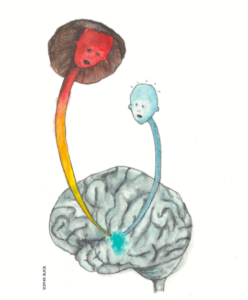FRIDAY, 7 JULY 2017
As strange as it sounds today, psychedelic drugs like LSD and psilocybin (magic mushrooms’ active ingredient) showed great clinical promise in the early 1960s. Several early scientific papers suggested that psychedelics could be used to treat psychiatric disorders and even for pain relief. However, the simultaneous rise in psychedelic use by the public at that time and the so-called youth counterculture led to their prohibition in many countries, including the UK. After that, research into psychoactive compounds took a dramatic dip - until now. Sophie Buck
Sophie BuckStudying the effects of psychedelic drugs helps scientist understand psychiatric disorders. Fletcher is interested in psychosis, an abnormal condition that causes hallucinations, among other symptoms. “The [hallucinogenic] drug ketamine can be used to study psychosis”, said Fletcher. Amusingly, Fletcher’s ketamine study captured the Daily Mail’s attention in an article entitled “Cambridge students paid £250 to take horse tranquilliser drug ketamine for schizophrenia research”. Fletcher clarified for the panel that ketamine is a suitable research model: participants take it in safe doses and in constrained and controllable experimental settings.
Importantly, psychosis - often defined as a ‘separation from reality’ - is a symptom of schizophrenia. Psychedelic drugs like ketamine can answer questions that other research tools cannot address. For example, animal models are not suitable, since examining their emotional and perceptual experiences is problematic.
Using ketamine, Fletcher and his team can answer questions like, “What are the mechanisms by which the psychotic symptoms emerge? Why do people have different psychotic experiences? What interventions can weaken the effects of ketamine?”
Psychedelics are also being revitalised as treatments for psychiatric illnesses. Roseman discussed his recent work, which uses fMRI to determine if psilocybin-assisted therapy can alleviate major depression. One experiment involved giving patients with treatment- resistant depression psilocybin, followed by brain imaging and clinical assessments:
“We saw a marked improvement in depressive symptoms compared to the pre treatment baseline, which was sustained [for at least 3 months]”
This long- term effect, achieved by just two increasing doses separated by one week, is remarkable, considering that most anti-depressants need to be taken continuously.
So what distinguishes psilocybin therapy from conventional antidepressants like selective serotonin reuptake inhibitors (SSRIs)? “SSRIs lead to a reduction in the activity of the amygdala [a brain area associated with fear and emotional learning], thereby suppressing feelings of negativity. In contrast, psilocybin led to increased amygdala activation in the depressed subjects. We think that through the psychedelics, the participants were able to confront and deal with their emotions, rather than avoiding them”, Roseman said. He hopes that larger-scale trials will follow these small, promising studies.
The CamBRAIN panel has highlighted that psychedelic drugs can be useful models for research and may even help treat psychiatric disorders. Thus, Amanda Feilding and other experts in the field advocate making psychedelic drugs legal for research purposes. Nonetheless, psychedelic drugs can have harmful physical and psychological effects, even when used with medical assistance. The pros and cons of legalising psychedelic drugs for research will therefore need to be carefully considered, while keeping an open mind.
Banner image credit: Matt
